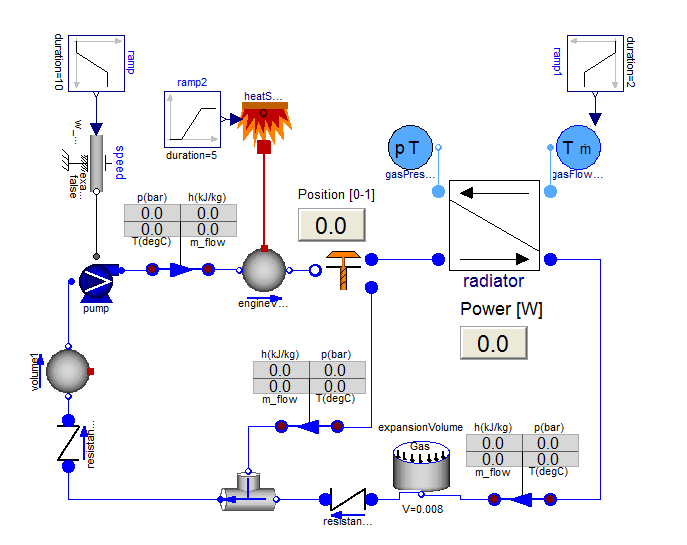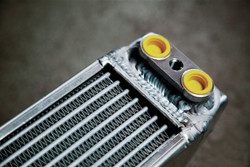The Modelica Liquid Cooling Library is used for modeling and simulation of liquid cooling systems for virtual prototyping, component dimensioning and control design.
The library includes more than 80 internal flow components such as pipes, bends and junctions with predictive geometry-based flow resistance correlations. It also includes generic components that can be calibrated from measurement data.
More than twenty fluid models are provided in the library, with temperature-dependent properties to support cooling system modeling for water, customizable glycol-water and alcohol-water mixtures, every relevant water-salt mixture (e.g. potassium carbonate), calcium chloride, sodium chloride, potassium acetate, etc. The library also contains SAE oil model and even jetfuels.
Pre-configured templates guide users in creating simplified, high-performance heat exchanger stack models with 3D visualizations for parameter verification and presentation of resulting temperatures.
The Liquid Cooling Library can be used effectively in conjunction with geometry-based models from the Heat Exchanger Library.

Diagram of a cooling circuit. The library contains the relevant components to accurately model, for example, the cooling of a combustion engine.


APPLICATION
Heat exchanger stacks
The heat exchanger stack is a key coupling point between the fluid circuits. Both Liquid Cooling Library and Heat Exchanger Library include models of heat exchanger stacks. These models differ in terms of details.
Heat Exchanger Library allows detailed, geometry-based models which can be stacked.
The stack models in Liquid Cooling Library require only the basic stack geometry and can use mapped heat exchangers with imposed airflow based on external inputs from CFD, etc. The air temperatures through the stack are calculated based on the stack geometry with a single calculated input temperature for each heat exchanger based on preceding heat exchanger outlet temperatures. Liquid Cooling Library includes assembled stack models ranging from 2-8 heat exchangers.
Effectiveness data, though simplified, are often available early in vehicle development programs and thus can support fast assessment of cooling pack concept as well as thermal system design and performance.
Check out the full details of the study at Integrated Vehicle Thermal Management in Modelica.
The Liquid Cooling Library is used in automotive, industrial equipment and process industries. Applications include:
- Pump dimensioning
- Control of thermal transient response
- Engine cooling
- Battery thermal management
- Cooling of power electronics and machines.
District heating
A district heating network is a textbook example of a dynamic system. Subject to a wide range of boundary conditions and delays, its optimal operation point varies correspondingly. The Liquid Cooling Library contains the relevant pressure drop models, valves and heat exchanger models to accurately represent a district heating network. Previous projects have resulted in reductions in operational costs by adapting the water supply temperature and intelligent valve control.
By using the Thermal Power Library, a realistic model of the power plant can also be integrated.
Cooling of power electronics and machines
The components as well as the fluids in the Liquid Cooling Library are adapted for the development of cooling systems for power electronics and machines. Appropriate pressure drop models, heat exchanger models and coolant models are available. The library has successfully been used for the analysis of cooling systems in the power electronics of wind turbines.
Fuel system design
Fuel supply and distribution is not a trivial task. A great number of applications, including engine design in the aerospace industry, require the fuel to act as coolant. Given the inhomogeneity of the components of the fuel, a recurrent problem is the creation of fuel vapour. The Liquid Cooling Library includes relevant fuel and jet fuel models.
Resources
Modelon Libraries
Related News & Blog
Ready to use Modelon's libraries for powerful system simulation?
Get in touch with us today to see how Modelon’s libraries handle complex modeling and return accurate results.


